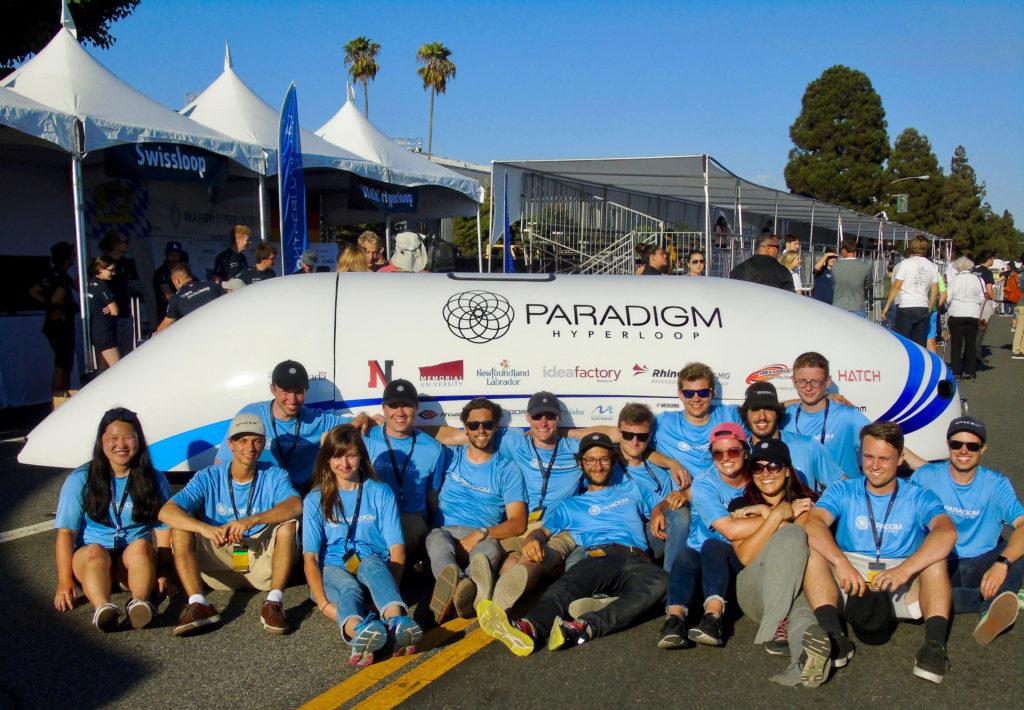By Victoria Dominguez, news correspondent
Members of Paradigm, Northeastern’s hyperloop team, secured second place in the SpaceX Hyperloop Pod Competition this Aug. 25 to 27 in Hawthorne, California.
Twenty-five hyperloop teams from across the world competed to develop a new method of passenger transportation between major cities by sending low-pressure pods through a system of tubes, with the goal of reaching 760 miles per hour.
“We were pretty optimistic about how it was gonna go,” said Theodore Rausch, a junior mechanical engineering major and a project lead who helped oversee group progress and communication. “The competition is kind of ‘Survivor’-esque, but everyone is friendly and not cut-throat.”
Paradigm Hyperloop and other competing teams were selected from thousands of designs to test their pods on a mile-long track. The Paradigm pod, made of an aluminum frame, is 18 feet long and weighs 1,800 pounds, according to former business lead Benjamin Lippolis, a 2017 alumnus who oversaw the team’s financial matters. The groups were ranked by their pods’ speed, with Paradigm’s model clocking in at 63 miles per hour, behind the 1st place team who reached 201 miles per hour and ahead of the 3rd place team who reached 25 miles per hour.
SpaceX founder and CEO Elon Musk created the event as an open-ended competition to challenge university students to create and test pod-like vehicles that may one day serve as a means of high-speed commercial transportation.
“Because of low pressure and levitation, the speeds can be really high,” said Mehdi Abedi, an industrial and mechanical engineering professor at Northeastern and Paradigm’s faculty adviser. “You can go, for example, from L.A. to San Francisco in half an hour, which is normally about five hours or more.”
There are two proponents, levitation and propulsion, but the group focused their efforts solely on levitation.
“We were the only team to make a functional air bearing based pod, rather than magnetic,” said Lippolis.
Paradigm was established three years ago when a student approached Abedi about creating a team to join the SpaceX competition. What started as a small band of mechanical engineering students expanded into a multi-disciplinary project, and subsequently an international collaboration. The team currently consists of students from Northeastern as well as two universities in Canada—Memorial University of Newfoundland and Labrador and College of the North Atlantic.
“More important than engineering was the teamwork,” Abedi said.“This group was amazing to accept the leadership of one of their own and assign tasks and keep track of it.”
As Paradigm members rarely had the opportunity to meet in person with their partners at other universities, they relied heavily on Google Hangout video chats and databases to assign responsibilities, track progress and facilitate discussions. After a team restructuring following their first competition in January due to communication issues, Paradigm has worked to improve upon their original design as well as their intercollegiate communication.
“We worked for the last eight months to overhaul the last prototype we made,” said Rausch. “One of the biggest things we have had to deal with is communication between the other schools.”
Northeastern has provided Paradigm with work space, basic materials and some funding. Most funds, however, were secured through the students themselves, who raised over $150,000 in donations and government funding, Abedi said.
In Canada, the team was able to receive both local and federal funding. The SpaceX competition even caught the attention of Canadian Prime Minister Justin Trudeau, prompting him to tweet a good luck message to Paradigm and Waterloop, the hyperloop team at the University of Waterloo in Ontario.
Congratulations & best of luck to @waterloo_hyper and @paradigm_hype at this week’s @SpaceX @Hyperloop Pod Competition!
— Justin Trudeau (@JustinTrudeau) August 22, 2017
Members of Paradigm were proud to represent Northeastern throughout the project and drew from their knowledge and experiences in classes and co-op, Rausch said.
“The knowledge that they used for designing is learned at co-op,” said Abedi. “Their passion to go out and find the knowledge is something that is part of the education we have here.”
Abedi said Paradigm members are highly satisfied with their second place outcome. Rausch said that the team is already looking ahead to the next SpaceX competition in 2018.
Rausch also said that a breakthrough in transportation is much needed and long overdue, especially with regard to Boston’s outdated transportation system.
“Boston is kind of representative of the state of infrastructure,” Rausch said. “There haven’t been a ton of innovations and a ton of work put into large-scale projects.”
Abedi is optimistic about the possibility of Paradigm’s students being involved in the transportation breakthrough.
“Right now they are the most expert people in this field,” Abedi said. “They designed it, they made it and it works.”









